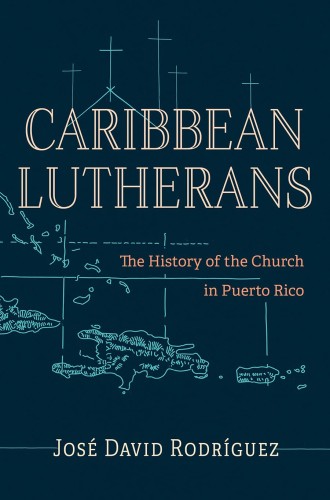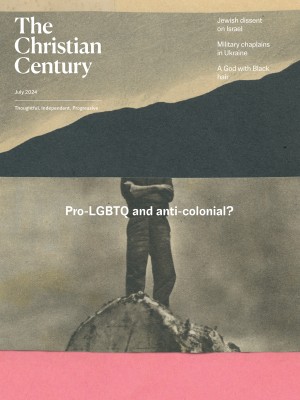Puerto Rico as both object and subject of mission
José David Rodríguez provides a decolonial history of Lutheranism in the world’s oldest colony.

Caribbean Lutherans
The History of the Church in Puerto Rico
Some of us read denominational histories the way others read memoirs. We are tremendously curious to learn how institutions developed, and the more granular the better. José David Rodríguez’s Caribbean Lutherans: The History of the Church in Puerto Rico does not disappoint. It will sit on my shelves alongside other influential denominational histories like E. Clifford Nelson’s The Lutheran Church among Norwegian Americans and Early Lutheran Activities in the Ozarks by Homer A. Stevens.
Denominational histories are, by their very nature, somewhat programmatic. Historians start by looking at the recorded history of the mission. Missionaries often create the most records because the nature of their work necessitates reporting progress back to their funding sources. Yet Idalia Negrón, currently the bishop of the Caribbean Synod of the Evangelical Lutheran Church in America, reports in her foreword to the book that when she and Rodríguez visited the Historical Archive of Puerto Rico to research how the Lutheran mission began there, they could find no information. Rodríguez’s book is a very real witness to persistence in recovering the history of the church he loves.
Read our latest issue or browse back issues.
Rodríguez writes “from the experience of being missionized,” but he is aware that he holds a dual identity that theologian Carlos Cardoza-Orlandi describes as being both “the object and subject of mission.” As Luis Rivera-Pagán highlights in the book’s afterword, Puerto Rico is the world’s oldest colony, and Rodríguez employs a decolonial methodology. There were moments prior to the 19th century—Rodríguez calls them incursions—when Lutherans (including Lutheran corsairs and Bible smugglers!) were present in the West Indies. Lutherans from the United States began their mission in Puerto Rico in 1899, shortly after the US took control of Puerto Rico from Spain. A shift toward Protestantism followed because, as Rodríguez notes, “coloniality has traditionally designed a religious perspective.”
Lutheranism in Puerto Rico grew slowly but steadily throughout the first half of the 20th century. Rodríguez highlights how, for the first several decades, annual growth averaged in the teens, but such numbers added up over time. By the 40th anniversary of the Lutheran mission, there were “a total of thirteen organized congregations, with 1,040 confirmed and 3,286 baptized members. The eighteen Sunday schools reported 101 teachers and 2,306 pupils, there were ten Luther Leagues with a membership of 362, nine Women’s Missionary societies with 275 members, and five Brotherhoods with a membership of 140.” In 1940, the mission published its first hymnal, Manual de Culto Cristiano.
Rodríguez’s book, which is truly the first of its kind, illustrates the unique space Puerto Rico inhabits as a location for colonization. Given how long Puerto Rico had already been a colony, Lutheranism emerged not in the context of an entirely religious and cultural other but rather in the shared space of Roman Catholicism and Protestant missions. In other words, the history of Lutheranism in Puerto Rico is inherently ecumenical. It was also quite different from most of the other foreign missions, which accompanied “Lutheran colonists in their efforts to develop their ethnic culture, language, and traditions overseas.” The Puerto Rico mission from the outset used the vernacular Spanish and carried on its work with foreign and native religious leaders together, moving “forward together in developing opportunities for the emergence of a church body that struggled for the well-being of people in the margins of society.”
Given Rodríguez’s intent to write a decolonial history, I was disappointed that the book includes so few firsthand accounts of native Puerto Ricans. The book’s central chapters, which focus on the beginnings of the US Lutheran mission in Puerto Rico, utilize primarily stateside source materials. Rodríguez pores over Protestant studies journals, El Testigo (the mission’s own journal), newspapers, church bulletins, and expansive bibliographic sources from seminaries in Puerto Rico. This reliance on external sources—which may simply have been a result of what is available—results in a book that offers more descriptive texture for the work of the missionaries than for the vernacular Lutheranism that was cultivated in local congregations.
Still, as a Lutheran pastor, I’ve long witnessed the significant impact the Caribbean Synod (which encompasses Puerto Rico and the US Virgin Islands) has had on my denomination. Caribbean Lutherans helps me understand what I already sensed intuitively. Not quite an ethnic-specific synod comparable to those the ELCA incorporated in the late 20th century (such as the Slovak Zion Synod), and also quite different from the many continental US-based synods, the Caribbean Synod continually finds creative ways to invite American Lutherans to know and see themselves differently.






